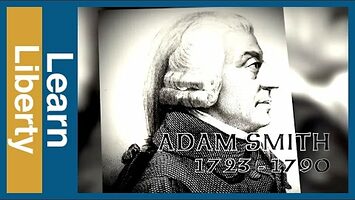Wealth & Poverty
Encyclopedia
Wealth results from producing things that consumers value most by sacrificing the least valuable combinations of labor and resources. The best place to begin a discussion of wealth is with the division of labor (or specialization), which Adam Smith discusses in the first chapter of Wealth of Nations. Understanding the conditions that create wealth also provides useful insight into those conditions that result in poverty.
Dividing workers’ tasks into narrow productive specialties increases the amount that can be produced by increasing one’s skills in that activity, reducing the time spent shifting from one activity to another, and increasing the amount of capital that one can effectively employ. If most workers had to make more than a small contribution to the production of the goods they were involved in producing, only a fraction of us would long survive, and those who did would live in extreme poverty, as most of what we now consume would be prohibitively costly. However, although specialization is necessary for producing the abundance of goods and services that constitute wealth, it is not sufficient. Specialization cannot be fully productive without freedom and coordination—the freedom of each individual to use his specialized skills in accordance with his knowledge of local conditions while somehow making sure that his actions are coordinated with countless others with the same freedom.
In an unfree economy, the decisions of remote planners lacking relevant information on local conditions are substituted for the decisions of those who have this information. As Hayek eloquently explained, centralizing economic decisions inevitably substitutes ignorance for the local knowledge essential for making choices fully consistent with the production of wealth.
Without overall coordination, each individual could be competent at what he is doing and could be adjusting well to local conditions, but is likely to fail to combine his activities with those of others to produce goods, much less the combination and quality of goods most valued by consumers. People often believe that this supposed inability to coordinate action over a distance suggests a trade-off between freedom and coordination. More freedom reduces coordination, and more coordination can be achieved only by reducing freedom. Thus, the best possibility seems to be some compromise between making decisions that fully utilize local information and coordinating the decisions that are made in the most productive way. Fortunately, this situation is one of the few where economists do not see a trade-off. Adam Smith’s fundamental insight, as developed in Wealth of Nations, is that the wealth-producing advantages of specialization can be realized—indeed, more fully realized—when there are no authorities attempting to coordinate private decisions. Coordination is best achieved without a coordinator. As Smith stated,
The statesman who should attempt to direct private people in what manner they ought to employ their capitals [including human capital embodied in labor], would not only load himself with a most unnecessary attention, but assume an authority which could safely be trusted, not only to no single person, but to no council or senate whatever, and which would nowhere be so dangerous as in the hands of a man who had folly and presumption enough to fancy himself fit to exercise it.
But how can decisions based on local knowledge be coordinated without central direction? Explaining how this coordination occurs under the right set of economic institutions has been a central achievement of economic analysis since Adam Smith. Critical to this achievement is understanding how countless people, each pursuing their own interests, collectively communicate information on how everyone can use their individual talents and resources to best serve the interests of others, and to do so in a way that motivates each to do exactly that. The institutions that make this communication and coordination possible are those associated with a market economy. In general terms, these institutions consist of private property, a stable currency, and a legal system that protects property rights and enforces mutually agreed-on contracts, all of which facilitate voluntary exchanges.
The market prices that result from these exchanges allow people to communicate both the information vital to coordinating their actions and the incentives for them to do so. This “information economy” and its wealth-enhancing productivity are not new. Indeed, the “information economy” is as old as economies based on voluntary exchange and market prices, as a discussion of the major types of market communication and coordination easily illustrate.
Making the most valuable use of a fixed supply of a consumption good requires communication and coordination between consumers. When some consumers decide they want more of a good, they communicate that information to other consumers through the higher prices resulting from their increased demand. The other consumers respond to this information by reducing their consumption of the good, which has the effect of sharing more of the good with those who now value it more. Those consumers who reduce their consumption need not know why the price has increased, nor need they care about those consumers whose demand has increased, but the higher price motivates them to act as if they did. Collectively, they will reduce their consumption by just enough for those with the higher demands to increase their consumption by the extra amount they desire at the higher price. This process represents a truly impressive amount of coordination, and it happens with countless goods without anyone being in charge.
Creating wealth by using resources and labor in their highest valued employment requires communication and coordination between consumers and producers. The first to respond to the price communication of increased demand from some consumers are other consumers. But these higher prices for a good also inform producers that the value gained from producing more of the good is now greater than the cost. Given a little time, this information will motivate a shift in labor and resources from the production of less valued goods to the production of the now more valued one. This shift will continue as long as the value of producing additional units of the good is greater than the value sacrificed by having fewer other goods. This coordination between producers and consumers keeps labor and resources constantly moving toward employments where they are worth more and away from employments where they are worth less.
The price communication between consumers and producers goes both ways. If the cost of producing a good increases for any reason, its price will go up, informing consumers that the same value of labor and resources in the production of other goods now creates less value in the production of this particular good than had been the case. Consumers respond to this information by reducing their consumption of this good, thus allowing its producers to create more value by shifting some of the labor and resources being used in its production to the production of other goods. This shift will continue to be motivated by further changes in market prices until no additional value results. In like manner, productive resources would move in the opposite direction in response to price communication if the cost of producing the good decreases. In either case, the spontaneous coordination between producers and consumers, informed and motivated by market prices, creates wealth by directing resources into their highest valued uses.
Producing something as simple as an ordinary wooden pencil is beyond the ability of any one person and requires extensive communication between producers. As one economist has explained, pencil production requires the coordinated efforts of highly specialized workers from all over the world, employed by a long chain of firms and using a large variety of widely dispersed resources and sophisticated capital equipment. Yet wooden pencils are conveniently available at prices so low that they are commonly given away as advertisements. Coordination among the many producers that are needed to produce a wooden pencil, not to mention far more complex goods, at the lowest possible cost would be impossible without the information communicated by market prices. Market prices inform producers which part of the productive process is most profitable for them to specialize in—that is, that part of the productive process where the most net value is added. When a producer has added as much net value as possible, the result is that it becomes more profitable to sell this output to another specialist, rather than to continue production. This market-motivated coordination results in far more wealth creation than would be possible were central planners to attempt to impose coordination.
The tremendous wealth from the freedom and coordination of the market does come at a price. Markets make freedom possible by imposing discipline on the use of freedom—discipline necessary for the coordination of markets. Those whose decisions are inconsistent with the desires of others, who are not using their labor and resources to serve others as well as possible, will have their jobs and personal wealth competed away by those who create more wealth by making decisions more consistent with the decisions and well-being of others. This discipline takes the form of bankruptcies, layoffs, and other types of financial losses. Such discipline is painful and commonly blamed on the harshness of market economies. Although it is easy to see the pain imposed by markets, it is difficult to make the connection between the information and discipline causing the pain and the wealth and freedom that result. As Machiavelli observed in another context, “Thoughtless writers admire [the] achievement … , yet condemn the main reason for it.”
The freedom and economic coordination made possible by market information and discipline constantly expands wealth by unleashing the creativity of entrepreneurship. Entrepreneurs are interested not just in making the best use of existing knowledge and resources, but in discovering new knowledge and resources by pursuing what most people have not thought about and might consider impossible if they had. Many, probably most, entrepreneurial ventures fail to create wealth, but without the freedom to try those that fail, there will be far fewer discoveries that succeed. Only when entrepreneurial freedom is guided by the information and ruthless discipline communicated and imposed by market prices will the entrepreneurial ventures that do not increase wealth be quickly identified and terminated, with resources redirected into the expansion of those that expand wealth. This process of entrepreneurial discovery explains not just the wealth of a market economy at any moment, but the growth in wealth that turns one generation’s luxuries into the next generation’s necessities and finds the goods limited to the wealthy of one generation widely available to the nonwealthy of the next. As Joseph Schumpeter pointed out, “Queen Elizabeth owned silk stockings. The capitalist achievement does not typically consist in providing more silk stockings for queens but in bringing them within the reach of factory girls in return for steadily decreasing amounts of effort.”
Unfortunately, although few recognize the connection between the discipline of the market and the wealth of the economy, we all are perfectly aware that our personal wealth would be increased if we were exempted from that discipline. If our jobs were protected, if our firms did not have to face competition, or if compassionate and well-intended policies were enacted to reduce the economic pain inflicted on us, we would be wealthier. More accurately, we would be wealthier if we were among the favored few who received such exemptions while everyone else had to continue coordinating their actions for the benefit of others even when that coordination required losing their jobs, going out of business, or giving up on their entrepreneurial dreams. However, any serious attempt by government to universalize these safeguards, to protect everyone from the discipline of the marketplace, would quickly convert wealth into poverty by suppressing the communication, coordination, and freedom of the market.
Further Readings
Buchanan, James M., and Yoon, Yong J. The Return to Increasing Returns. Ann Arbor: University of Michigan Press, 1994.
Hayek, Friedrich A. “The Use of Knowledge in Society.” The American Economic Review 35 (1945): 519–530.
Machiavelli, Niccolò, Quentin Skinner, and Russell Price, eds. The Prince. Cambridge: Cambridge University Press, 1988.
Read, Leonard. “I, Pencil.” The Freeman 8 (1958): 32–37.
Schumpeter, Joseph A. Capitalism, Socialism and Democracy. New York: HarperTorch Books, 1950.
Smith, Adam. An Inquiry into the Nature and Causes of the Wealth of Nations. Indianapolis, IN: Liberty Fund, 1981.















